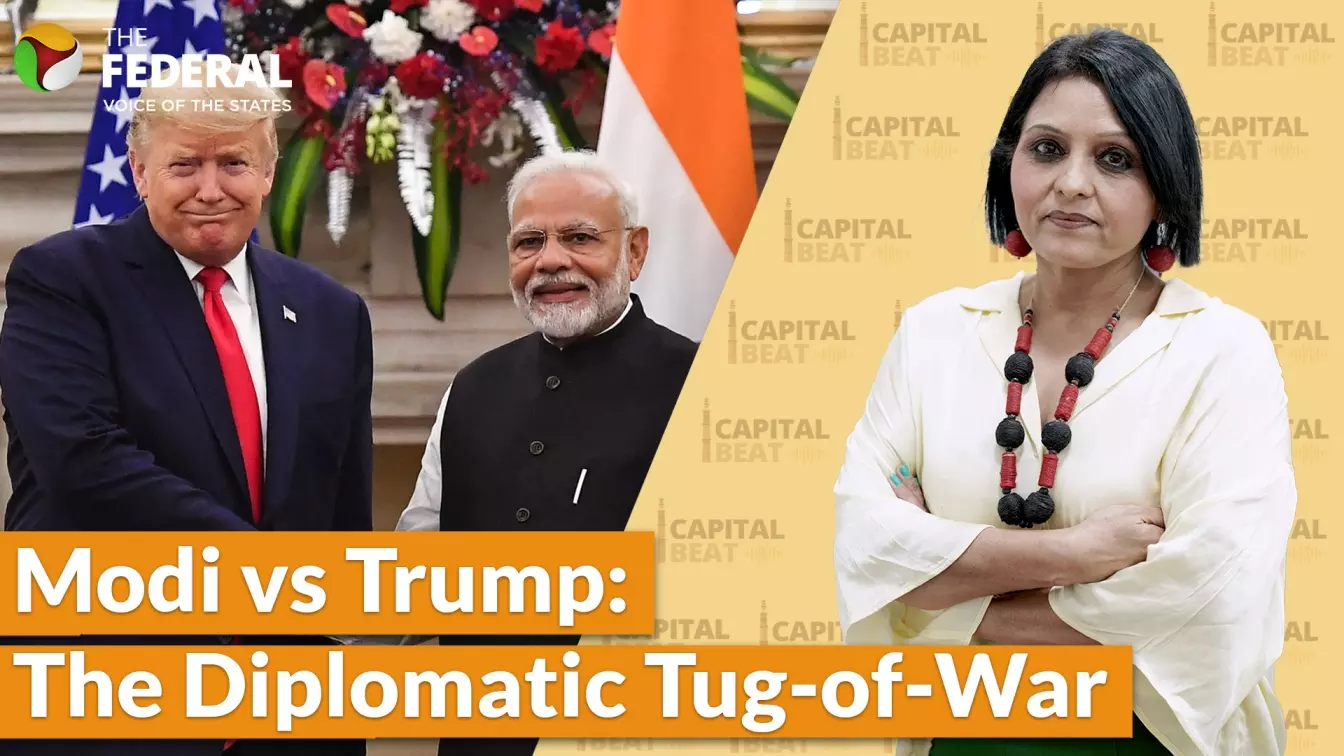
Discussion | Ceasefire drama: Did the US mediate? India says no
India denies US role in Indo-Pak ceasefire. With Trump repeating his claim, is New Delhi losing diplomatic control?

In this edition of Capital Beat, panellists Mohan Guruswamy, Dr. Aftab Kamal Pasha, and K S Dakshina Murthy unpack India’s diplomatic balancing act after US President Donald Trump once again claimed credit for brokering a ceasefire between India and Pakistan. With Prime Minister Narendra Modi pushing back on mediation claims and the Ministry of External Affairs (MEA) issuing denials, the panel debates whether this is a serious diplomatic rift or just another storm in a teacup.
Trump’s claim vs Modi’s denial
The episode opens by revisiting Trump’s fresh assertion that he negotiated peace between India and Pakistan. This directly contradicted India’s official line, articulated by Foreign Secretary Vikram Misri, that the ceasefire was coordinated bilaterally by the two DGMOs without any third-party mediation.
Guruswamy responded with characteristic sharpness: “Trump imagines lots of things. It’s now well established that he lives in a world of his own fantasies.” He went on to differentiate between mediation in conflicts and mediation in territorial disputes, recalling that the US had played a role during the Kargil War under President Bill Clinton, but never in Kashmir talks.
Also read: After phone call with Modi, Trump repeats claim he stopped India-Pakistan war
While defending the government’s stand, Guruswamy also said, “The Prime Minister is very artful with words. He dodges around… he says we denied mediation, but doesn’t clarify what kind of mediation.”
Is India doing enough?
Dr. Pasha viewed the incident through the lens of global perception. “The first mention of ceasefire came from the US, then India and Pakistan accepted it. Trump is leveraging that sequence to claim credit,” he said. Dr. Pasha expressed concern that India’s silence, particularly Modi’s, may be misinterpreted globally. “There’s an element of doubt as to why PM Modi was silent… perhaps to avoid contradicting his ‘dear friend’.”
Also read: Trump says India, Pakistan leaders decided to end conflict, a first in weeks
He further argued that the US is not acting in isolation. Pakistan’s strategic importance for the US — especially in the context of Iran and China — cannot be ignored. “What flows after that Trump-Pakistan lunch is defence tech, even F-35s, and potential access to airbases.”
Strategic silence or tactical misstep?
Murthy took a more measured view. “India needs the US as much as the US needs India. This won't derail the relationship,” he said, suggesting that both Trump and Modi are engaging in narrative-building for domestic audiences. Murthy also highlighted that while India officially denies third-party involvement, past incidents suggest a nuanced reality.
Also read: What Modi told Trump on Op Sindoor pause: ‘India has and will never accept mediation’
He reminded viewers that “nobody disputes the fact that US officials like Marco Rubio (US Secretary of State) did speak to both sides. So, it’s open to interpretation.” He suggested Modi’s silence could be intentional. “Perhaps it is wiser not to take Trump seriously.”
Domestic optics and political fallout
As the conversation turned to internal political impact, Guruswamy argued that “India has been re-hyphenated with Pakistan,” something New Delhi worked hard to avoid. “But this is optics,” he added, explaining that allowing Pakistan to initiate the ceasefire talks created an impression of them backing down, which suited India politically.
Also read: Modi-Trump talk: Congress demands all-party meeting upon PM's return to brief leaders
Murthy said this event is unlikely to shake India-US ties in a fundamental way. “Everyone wanted this to end. The ceasefire was mutual — who said what is secondary.”
A calculated endgame?
Guruswamy concluded that global diplomacy involves managing perceptions. “Even if Xi Jinping calls, you’ll take the call. We didn’t call the Pakistanis; they called us — good optics.”
Dr. Pasha added, “Modi should have reminded Trump — ‘we agree to disagree’. But his silence leaves room for doubt.”
Murthy wrapped up the discussion with a pointed summary: “Whether it’s a US nudge or internal calculation, what matters is that the firing stopped. Everyone is holding on to their own version — and that’s just politics.”
(The content above has been generated using a fine-tuned AI model. To ensure accuracy, quality, and editorial integrity, we employ a Human-In-The-Loop (HITL) process. While AI assists in creating the initial draft, our experienced editorial team carefully reviews, edits, and refines the content before publication. At The Federal, we combine the efficiency of AI with the expertise of human editors to deliver reliable and insightful journalism.)

